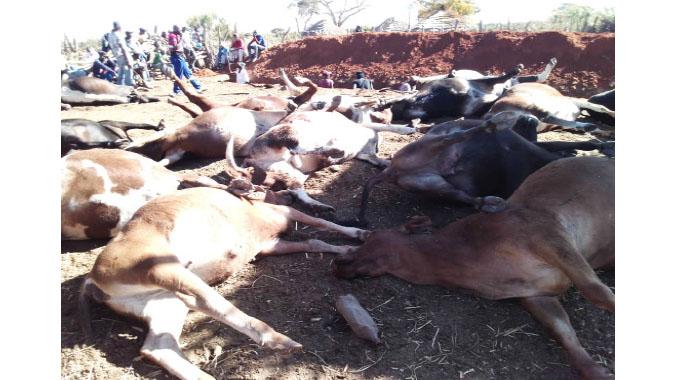News / National
Villager dies after losing 37 cattle to January disease
5 hrs ago | Views

A villager from Senkwasi in Zhombe, Midlands Province, has tragically died from high blood pressure after losing 37 head of cattle to January disease, a tick-borne infection that continues to wreak havoc on livestock in rural Zimbabwe.
The devastating loss was revealed during the official commissioning of the Senkwasi Village Business Unit and a newly constructed solar-powered dip tank on Monday. The two projects, both funded under the Constituency Development Fund (CDF), are part of efforts to improve rural livelihoods through agricultural innovation and disease control.
Zhombe legislator Edmore Samambwa, addressing villagers at the event, described the dip tank as a lifesaving intervention.
"This dip tank is not just infrastructure, it is a lifeline," said Samambwa. "One of our villagers recently passed away from high blood pressure after losing 37 cattle to January disease. This facility could have prevented such a tragedy."
January disease, or theileriosis, is a deadly tick-borne illness that peaks during the rainy season, especially in January. It has led to significant livestock losses across the Midlands, pushing rural households into economic distress.
Midlands Provincial Affairs and Devolution Minister Owen Ncube commended the development, saying it reflects government's commitment to inclusive growth.
"This project reflects the new dispensation's commitment to bridging the rural-urban divide. Through climate-smart technologies and sustainable infrastructure, we are transforming rural communities into hubs of productivity and empowerment," Ncube said.
Traditional leader Headman Sikhanya celebrated the arrival of the dip tank and improved access to clean water.
"We used to travel long distances to dip our cattle. Now it's right here in our village. This is a major relief," he said. "This area is usually dry, and we used to walk far just to find water. Now we can fetch clean water from the tap — it is a new life for us."
The Senkwasi Village Business Unit, established alongside the dip tank, is already bearing fruit. Beneficiary Maria Ndube shared how the project has transformed her life.
"Through the nutritional garden, I am now growing vegetables for sale. I can pay school fees for my children and provide for my family," she said.
The projects form part of the Rural Development 8.0 strategy, which seeks to industrialise rural areas and integrate smallholder farmers into broader value chains.
As the community mourns the loss of one of its own, villagers say the new dip tank and business unit offer hope for a more secure and sustainable future.
The devastating loss was revealed during the official commissioning of the Senkwasi Village Business Unit and a newly constructed solar-powered dip tank on Monday. The two projects, both funded under the Constituency Development Fund (CDF), are part of efforts to improve rural livelihoods through agricultural innovation and disease control.
Zhombe legislator Edmore Samambwa, addressing villagers at the event, described the dip tank as a lifesaving intervention.
"This dip tank is not just infrastructure, it is a lifeline," said Samambwa. "One of our villagers recently passed away from high blood pressure after losing 37 cattle to January disease. This facility could have prevented such a tragedy."
January disease, or theileriosis, is a deadly tick-borne illness that peaks during the rainy season, especially in January. It has led to significant livestock losses across the Midlands, pushing rural households into economic distress.
Midlands Provincial Affairs and Devolution Minister Owen Ncube commended the development, saying it reflects government's commitment to inclusive growth.
Traditional leader Headman Sikhanya celebrated the arrival of the dip tank and improved access to clean water.
"We used to travel long distances to dip our cattle. Now it's right here in our village. This is a major relief," he said. "This area is usually dry, and we used to walk far just to find water. Now we can fetch clean water from the tap — it is a new life for us."
The Senkwasi Village Business Unit, established alongside the dip tank, is already bearing fruit. Beneficiary Maria Ndube shared how the project has transformed her life.
"Through the nutritional garden, I am now growing vegetables for sale. I can pay school fees for my children and provide for my family," she said.
The projects form part of the Rural Development 8.0 strategy, which seeks to industrialise rural areas and integrate smallholder farmers into broader value chains.
As the community mourns the loss of one of its own, villagers say the new dip tank and business unit offer hope for a more secure and sustainable future.
Source - Southern Eye









































